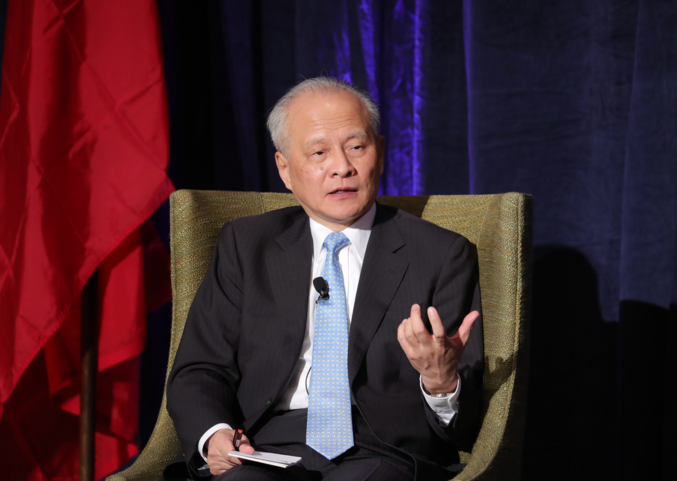WASHINGTON, Aug. 10 (Xinhua) --The United States should better understand the realities in Asia and refrain from taking advantage of any disputes in the region or even escalating the situation, Chinese Ambassador to the United States Cui Tiankai has said.
"I myself was involved in dealing with many of the issues in Asia. I know China and all our neighbors just want to have normal, stable, friendly and mutually beneficial relations," Cui said in an online interview when he was attending the 2020 Aspen Security Forum on Aug. 4.
"We do have disputes, like the border disputes with India, and some territorial disputes in the South China Sea," he said, adding that "but on the whole, all the countries in our region want to develop mutually beneficial relations. I don't think any one of them wants to see any escalation of tension. This is also the reality."
"I have full confidence that between China and our neighbors, we will be able to solve any problem through friendly and peaceful negotiation without external interference, without external attempts to escalate the situation," he said.
For instance, the ambassador said, China has already solved the border issues and concluded treaties with 12 of the 14 countries with which it has land borders.
"We have India and Bhutan which are the only two left. Maybe we are not able to solve the border issue in a short while. But I don't think this issue should dominate relations between China and India. And I think our Indian friends would share my view," Cui said.
"Hopefully, our American friends could have a really better understanding of the realities in our region, could really understand our concern, our perception, and what we need, what the people in the region really need, and could refrain from taking any action to take advantage of any disputes in the region or even escalate the situation," he said.
Noting that there is a long history behind the situation in the South China Sea, the ambassador said, "we have our historical claim and we have strong historical and legal support for our claims, but still we are ready to negotiate with other countries concerned for a peaceful solution to the disputes. That's why we are working with the ASEAN countries over the years." Cui had worked for quite a few years with the ASEAN countries on drawing up the Declaration of Conduct for the parties concerned.
"Now we are working on the code of conduct between China and ASEAN countries, and we are making good progress. We always believe that any territorial disputes shall be resolved through negotiations by the parties directly concerned. And we certainly aim to have a diplomatic solution, a negotiated solution. This is our commitment. It's not changing," he said.
"In the meantime, we should really work together to maintain stability of the region, and all of these sea lanes are extremely important for the Chinese economy. A large portion of our imports and exports have to go through these sea lanes," he said. "So we really have high stakes in the safety and security of navigation. So if these things are left to the countries concerned to work out, the situation would be much better."
"The problem is the intensifying U.S. military activities in the region. The U.S. is sending more and more warships, military airplanes more frequently to the region. This is really raising the risks of any conflicts or confrontation," he said. Enditem




 A single purchase
A single purchase









